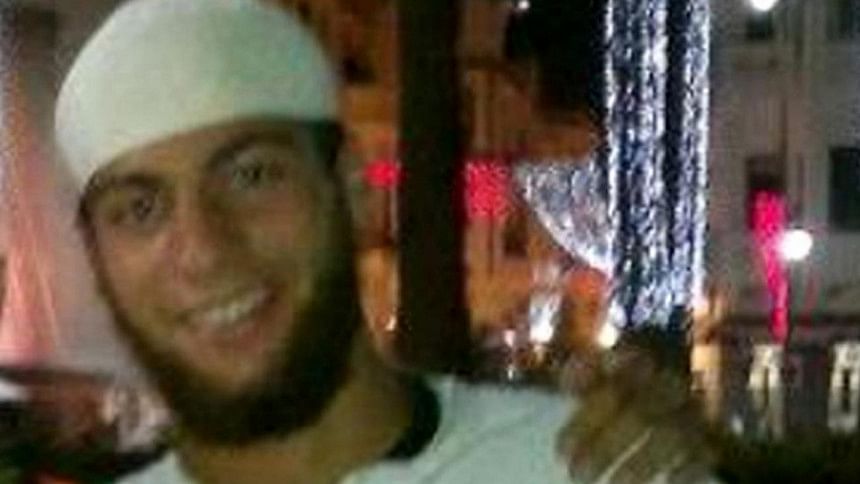France train gunman ‘dumbfounded’ by terrorism allegations

President Francois Hollande will on Monday bestow France's highest honour on a group of Americans and a Briton who have been hailed as heroes for overpowering a Moroccan gunman on a crowded train.
Anti-terror investigators are questioning the alleged attacker, 25-year-old Ayoub El Khazzani, who boarded a high-speed train in Brussels bound for Paris on Friday armed with a Kalashnikov assault rifle, a Luger automatic pistol, ammunition and a box-cutter.
Witnesses say he opened fire, injuring a man before being wrestled to the floor and subdued by three American passengers, including two off-duty servicemen, and a 62-year-old Briton.
Hollande will personally thank the group for their bravery on Monday, when he is to award them the country's Legion d'Honneur medal. The ceremony is expected to be attended by Belgian Prime Minister Charles Michel and the US Ambassador to Paris Jane Hartley.
Several French ministers, the mayor of the town closest to where the incident occurred and the president of France's national rail company are also due to attend.
Khazzani is said to have told investigators he is "dumbfounded" by accusations he was intending to carry out a terror attack, and insists he was only trying to rob passengers.
He said he merely stumbled upon a weapons stash in a park in Belgium and decided to use it to rob passengers, according to Sophie David, a lawyer assigned to his case when he was taken off the train in Arras, northern France.
"He is dumbfounded that his act is being linked to terrorism," David told BFM-TV, adding that Khazzani said he was homeless.
David is no longer representing Khazzani as he has been transferred to a police station near Paris for questioning.
'Football and fishing'
Khazzani's father, meanwhile, described his son on Sunday as a "good boy" who preferred talking about "football and fishing" to politics.
"I have no idea what he was thinking and I have not spoken to him for over a year," Mohamed El Khazzani told British newspaper The Daily Telegraph in Algeciras, Spain.
Under French law, suspects in terrorism-related investigations can be questioned for up to 96 hours, meaning Khazzani could be held until Tuesday evening.
Intelligence services in Belgium, France, Germany and Spain have previously flagged him as an Islamic extremist.
But one of the Americans who overpowered him told a press conference on Sunday that if Khazzani had known how to handle guns, he could have killed many people.
"He clearly had no firearms training whatsoever," National Guardsman Alek Skarlatos said.
"If he knew what he was doing or even got lucky and did the right thing, he would have been able to operate through all eight of the (ammunition) magazines and we probably wouldn't be here today along with a lot of other people."
A Spanish counter-terrorism source said Khazzani had lived in Spain for seven years until 2014. He came to the attention of Spanish authorities for making hardline speeches defending jihad.
Spanish intelligence services say he went to France, from where he travelled to Syria, but the suspect has reportedly denied going to the conflict-ridden country where the Islamic State group controls swathes of territory.
Crossing into France
Khazzani is accused of emerging from a toilet cubicle on the high-speed train, brandishing the weapons, just after it crossed from Belgium into northern France.
A French passenger who first encountered him tried to disarm him but he got away and fired at least one shot, wounding a French-American traveller in his 50s.
The attack was stopped when the two off-duty US servicemen and their friend Anthony Sadler, a student, charged the gunman and restrained him.
In a press conference at the US ambassador's residence in Paris, 23-year-old Sadler dismissed suggestions that Khazzani was not trying to kill anyone.
"It doesn't take eight magazines (of bullets) to rob a train," he said.
The Americans told the press conference that they had reservations in the first-class carriage where the attack took place, but could not initially find their seats.
They only moved to the carriage half an hour into the journey because the wireless Internet was poor and they were seeking a better connection.
Spencer Stone, who serves in the US Air Force, reached the gunman first and was slashed in the neck and on the eyebrow and almost had his thumb sliced off with a box-cutter.
"The gunman would have been successful if my friend Spencer had not gotten up," said Sadler. "I want that lesson to be learned. In times of terror like that to please do something. Don't just stand by and watch."

 For all latest news, follow The Daily Star's Google News channel.
For all latest news, follow The Daily Star's Google News channel. 



Comments